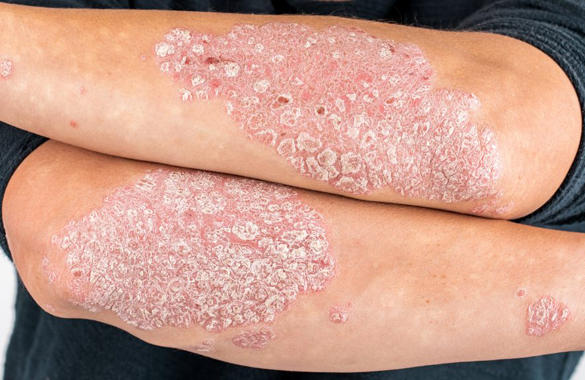


Psoriasis is a skin disease wherein the body produces new skin cells at a faster rate than usual, i.e., in days rather than weeks. As a result, these cells accumulate on the skin’s surface, creating noticeably thick, scaly areas.
The most prevalent kind of psoriasis is plaque psoriasis which presents as thick, scaly areas on the skin. Plaque psoriasis affects around 80% to 90% of patients with psoriasis.
The most prevalent kind of psoriasis is plaque psoriasis which presents as thick, scaly areas on the skin. Plaque psoriasis affects around 80% to 90% of patients with psoriasis.
Psoriasis affects people of all ethnicities and age groups. Although the exact cause of psoriasis is not understood, it is caused by a complex interplay of multiple factors that include-
Apart from these, the following factors are considered as psoriasis triggers which can lead to disease flare ups:
That is why it is critical for people with psoriasis to identify what triggers their psoriasis in order to reduce flare ups of the disease.
Types of psoriasis can affect different parts on your skin, nails, and joints. If allowed to progress, psoriasis can cause a major concern for your life and must be addressed by a qualified skin specialist.
Psoriasis can affect individuals of any age, gender, or race. It is a common condition that can develop in both children and adults. While psoriasis can occur at any stage of life, it most commonly begins in early adulthood.
It is important to note that having a family history of psoriasis increases the risk of developing the condition, but it does not guarantee its occurrence. Psoriasis can affect people with varying backgrounds and lifestyles, and it is not limited to a specific demographic.
Psoriasis plaques can occur anywhere on the skin, although they are most commonly found on the:
The size of the plaques varies. They might occur as a single patch on the skin or combine together to cover a significant region of skin. Plaques, regardless of size, cause irritation to the skin. The irritation might become unbearable if not treated. Some people experience stinging, burning, or unpleasant, tight skin.
Because psoriasis is a chronic illness, it is beneficial to educate yourself about it and consult with top skin specialists in South Delhi. With the requisite treatment and knowledge, you can lessen your symptoms of psoriasis and achieve disease control. Taking care of your psoriasis can also help you feel better, enhance your overall health, and keep it from deteriorating.
Psoriasis is a bothersome disease and its symptoms accompany itching and discomfort. To pacify these symptoms, you may follow these precautions –
A diagnosis of psoriasis can be made on the basis of patient history and clinical examination.
Psoriasis symptoms tend to come and go periodically and keeping it under control is an ongoing process. It is advised to seek skin treatment in Delhi from a dermatologist who can help placate the symptoms and provide relief from psoriasis.
At DermaSure, we suggest medication and treatment for psoriasis depending on the severity of the disease. It can include certain creams/ointments to apply, oral medications, biological agents and light therapy (phototherapy).
Schedule an appointment with the top Dermatologist in Delhi to get the best psoriasis treatment.
Psoriasis is a chronic autoimmune condition that causes the rapid buildup of skin cells, leading to the formation of thick, scaly patches on the skin. It is not contagious.
The most common symptoms of psoriasis include red, inflamed skin covered with silvery scales, itching or burning sensations, dry and cracked skin, and sometimes, swollen and stiff joints.
There is a genetic component to psoriasis, and it tends to run in families. However, not everyone with a family history of psoriasis will develop the condition, and some individuals may develop psoriasis without any family history.
Psoriasis is a chronic condition with no known cure. However, various treatments can help manage the symptoms and reduce flare-ups, providing relief and improving the quality of life.
Psoriasis flare-ups can be triggered by certain factors such as stress, infections, injury to the skin, certain medications, hormonal changes, weather changes, and smoking.
The duration of psoriasis flare-ups varies from weeks to months, while the remission intervals between them might extend for months or even years. Finding and avoiding your unique triggers as much as possible is the key to prolonging remission and preventing flare-ups.
Submit your review | |
Leave Them To #1 Skin & Hair Specialist In Delhi